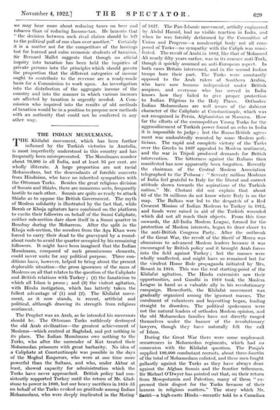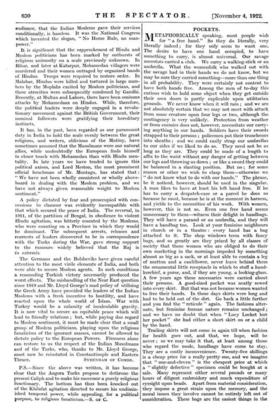THE INDIAN MUSULMANS. T HE Khilafat movement, which has been further
inflamed by the Turkish victories in Anatolia, is most imperfectly understood in this country and has frequently been misrepresented. The Musulmans number about 70,000 in all India, and at least 95 per cent. are wholly illiterate. A large proportion are not racial Mohamedans, but the descendants of forcible converts from Hinduism, who have no inherited sympathies with the Ottoman Turks. Besides the great religious division of Sunnis and Shiahs, there are numerous sects, frequently hostile to each other. Sunnis are quite as ready to attack Shiahs as to oppose the British Government. The myth of Moslem solidarity is illustrated by the fact that, while Borah or Khoja agitators have combined on the platform to excite their followers on behalf of the Sunni Caliphate, neither sub-section dare show itself in a Sunni quarter in Bombay during the Moharrem. After the split in the Khoja sub-section, the seceders from the Aga Khan were forced to carry their dead to the graveyard by a round- about route to avoid the quarter occupied by his remaining followers. It might have been imagined that the Indian Musulmans, composed of such promiscuous elements, could never unite for any political purpose. Three con- ditions have, however, helped to bring about the present deplorable situation—the gross ignorance of the mass of Moslems on all that relates to the question of the Caliphate and British relations with Turkey ; (2) the fanaticism to which all Islam is prone ; and (3) the violent agitation, with Hindu instigation, which has latterly taken the fullest advantage of (1) and (2). The Khilafat move- ment, as it now stands, is recent, artificial and political, although drawing its strength from religious sentiment.
The Prophet was an Arab, as he intended his successors should be. The Ottoman Turks ruthlessly destroyed the old Arab civilization—the greatest achievement of Moslems—which centred at Baghdad, and put nothing in its place. The Indian Musulmans owe nothing to the Turks, who after the surrender of Kut treated their Mohamedan prisoners with great barbarity. No idea of a Caliphate at Constantinople was possible in the days of the Moghul Emperors, who were at one time more powerful than the Sultans, and who, under Akbar at least, showed capacity for administration which the Turks have never approach6d. British policy had con- sistently supported Turkey until the return of Mr. Glad- stone to power in 1880, but our heavy sacrifices in 1854-55 on behalf of the Turks evoked no gratitude among Indian Moharnedafts. who were deeply implicated in the Mutiny of 1857. The Pan-Islamic movement, artfully engineered by Abdul Hamid, had no visible reaction in India, and when he was forcibly dethroned by the Committee of Union and Progress—a nondescript body not all com- posed of Turks—no sympathy with the Caliph was mani- fested. The revolt of Arabi in 1882, like that of Mohamed Ali nearly fifty years earlier, was in its essence anti-Turk, though it quickly assumed an anti-European aspect. In both cases Britain intervened, and in the second Indian troops bore their part. The Turks were constantly opposed to the Arab rulers of Southern Arabia, who have now become independent under British auspices, and everyone who has served in India knows how they failed to give proper protection to Indian Pilgrims to the Holy Places. Orthodox Indian Mohamedans are well aware of the dubious character of the Caliphate at Constantinople, which was not recognized in Persia, Afghanistan or Morocco. How far the efforts of the cosmopolitan Young Turks for the aggrandizement of Turkish power found an echo in India it is impossible to judge ; but the Russo-British agree- ment was undoubtedly resented by some Moslem poli- ticians. The rapid and complete victory of the Turks over the Greeks in 1897 appealed to Moslem sentiment, and the war in Tripoli produced demands •for British intervention. The bitterness against the Italians then manifested has now apparently been forgotten. Recently the chairman of the Central Moslem Association telegraphed to the Tribuna : " Seventy million Moslems of India feel grateful to Italy for the liberal and correct attitude shown towards the aspirations of the Turkish nation." Mr. Chotani did not explain that about 65 of the 70 millions do not know where Italy is on the map. The Balkan war led to the despatch of a Red Crescent Mission of Indian Moslems to Turkey in 1912, and funds were raised in aid of the Turkish wounded which did not all reach their objects. From this time onwards, the All-India Moslem League, formed for the protection of Moslem interests, began to draw closer to the anti-British Congress Party. After the outbreak of the Great War, the revolt of the Sherif of Mecca was obnoxious to advanced Moslem leaders because it was encouraged by British policy and it brought Arab forces into the field against Turkey ; but the masses were wholly unaffected, and might have so remained but for the virulent Home Rule propaganda initiated by Mrs. Besant in 1916. This was the real starting-point of the Khilafat agitation. The Hindu extremists saw their opportunities, and Gandhi in 1919 took the Moslem League in hand as a valuable ally in his revolutionary campaign. Henceforth, the Khilafat movement was gradually organized among the ignorant masses. The enrolment of volunteers and boycotting began, leading straight to disorders. The political spokesmen were not the natural leaders of orthodox Moslem opinion, and the old Mohamedan families have not directly ranged themselves under the banner of the revolutionary lawyers, though they have naturally felt the call of Islam.
During the Great War there were some unpleasant occurrences in Mohamedan regiments, which had no connexion with the Khilafat question. The Punjab supplied 180,000 combatant recruits, about three-fourths of the total of Mohamedans enlisted, and these men fought gallantly against the Turks as they have always done against the Afghan Sunnis and the frontier tribesmen. Sir Michael O'Dwyer has pointed out that, on their return from Mesopotamia and Palestine, many of them " ex- pressed their disgust for the Turks because of their laxness in religious matters." The story which Mr. Sastri—a high-caste Hindu—recently told to a Canadian audience, that the Indian Moslems gave their services conditionally, is baseless. It was the National Congress which invented the slogan, No Home Rule, no man- power."
It is significant that the rapprochement of Hindu and Moslem politicians has been marked by outbursts of religious animosity on a scale previously unknown. In Bihar, and later at Katarpur, Mohamedan villagers were murdered and their women outraged by organized bands of Hindus. Troops were required to restore order. In Malabar, Hindus were killed and tortured in large num- bers by the Moplahs excited by Moslem politicians, and these atrocities were subsequently condoned by Gandhi. Recently, at Mikan and Lahore, there have been ominous attacks by Mohamedans on Hindus. While, therefore, the political leaders were deeply engaged in a revolu- tionary movement against the British Government, their were gratifying their hereditary nominal followers instincts.
It has, in the past, been regarded as our paramount duty in India to hold the scale evenly between the great religions, and writers, oblivious of the Mutiny, have sometimes assumed that the Musulmans were our natural allies, while undoubtedly the European finds himself in closer touch with Mohamedan than with Hindu men- tality. In late years we have tended to ignore this political axiom, and Lord Meston, the most prominent official henchman of Mr. Montagu, has stated that : We have not been wholly consistent or wholly above- board in dealing with the Moslem problem, and we have not always given reasonable weight to Moslem sentiment."
A policy dictated by fear and preoccupied with con- cessions to clamour was evidently incompatible with that which secured the peace of India. The reversal, in 1911, of the partition of Bengal, in obedience to violent Hindu agitation, was bitterly resented by the Moslems, who were counting on a Province in which they would be dominant. The subsequent arrests, releases and rearrests of leaders discovered to be in correspondence with the Turks during the War, gave strong support to the rumours widely believed that the Raj is in extremis.
The Germans and the Bolsheviks have given careful attention to the most virile elements of India, and both were able to secure Moslem agents. In such conditions a resounding Turkish victory necessarily produced the worst effects. The mishandling of the Near East question since 1919 and Mr. Lloyd George's mad policy of utilizing the Greek Army have provided the leaders of the Indian Moslems with a fresh incentive to hostility, and have reacted upon the whole world of Islam. War with Turkey would be a calamity of incalculable gravity. It is now vital to secure an equitable peace which will lead to friendly relations ; but, while paying due regard to Moslem sentiment, it must be made clear that a small group of Moslem politicians, playing upon the religious fanaticism of the ignorant masses, cannot be allowed to dictate policy to the European Powers. Firmness alone can restore to us the respect of the Indian Musulmans and of the Turks, who, thanks to Mr. Lloyd George, must now be reinstated in Constantinople and Eastern P.S.—Since the above was written, it has become clear that the Angora Turks propose to dethrone the present Caliph and to make his successor a purely religious functionary. The bottom has thus been knocked out of the Khilafat agitation directed to secure his undimin- ished temporal power, while appealing, for a political purpose, to religious fanaticism.—S. OF C.







































 Previous page
Previous page